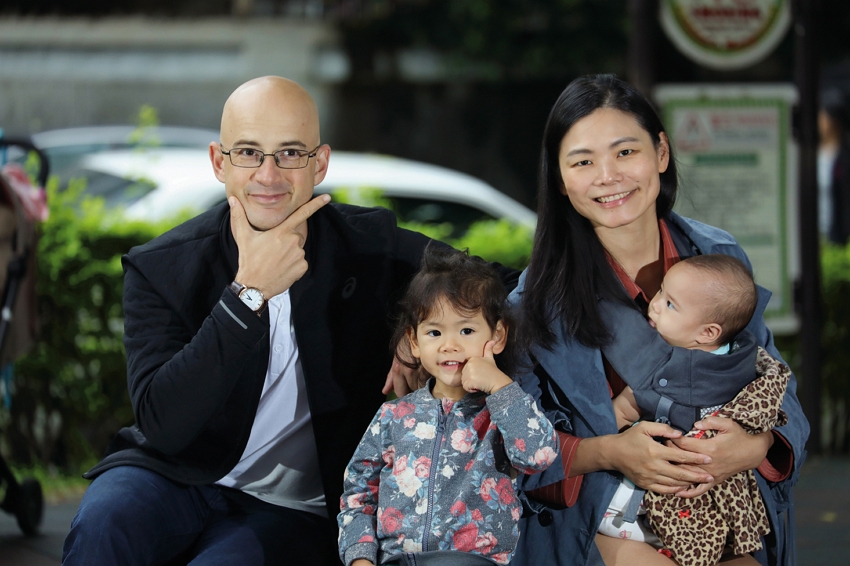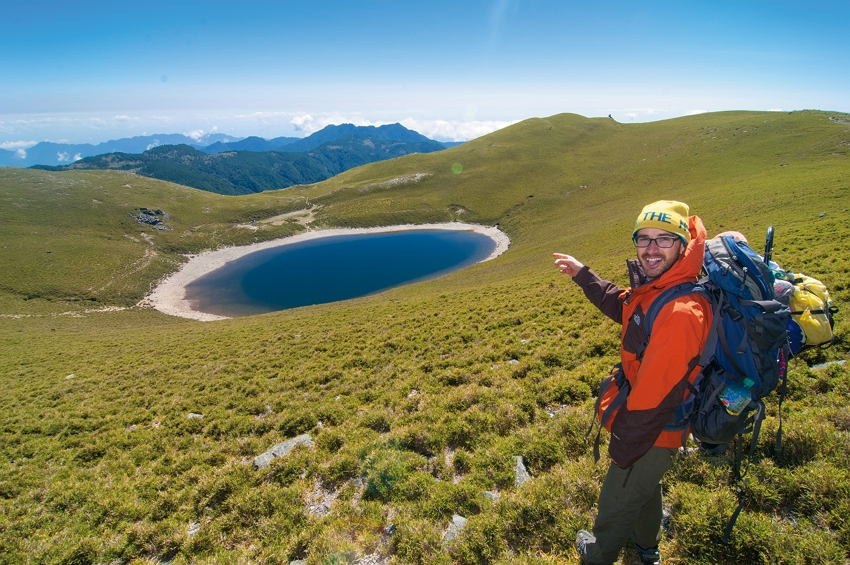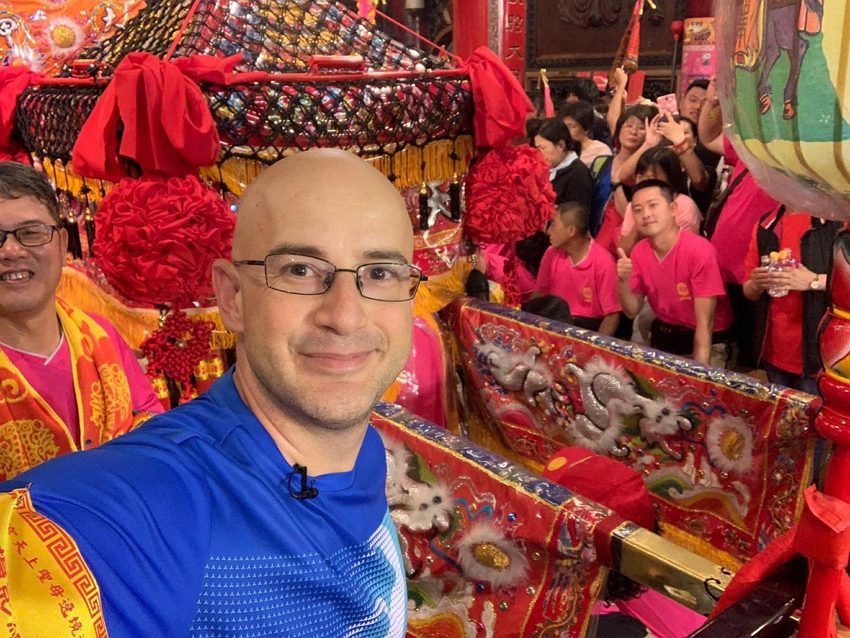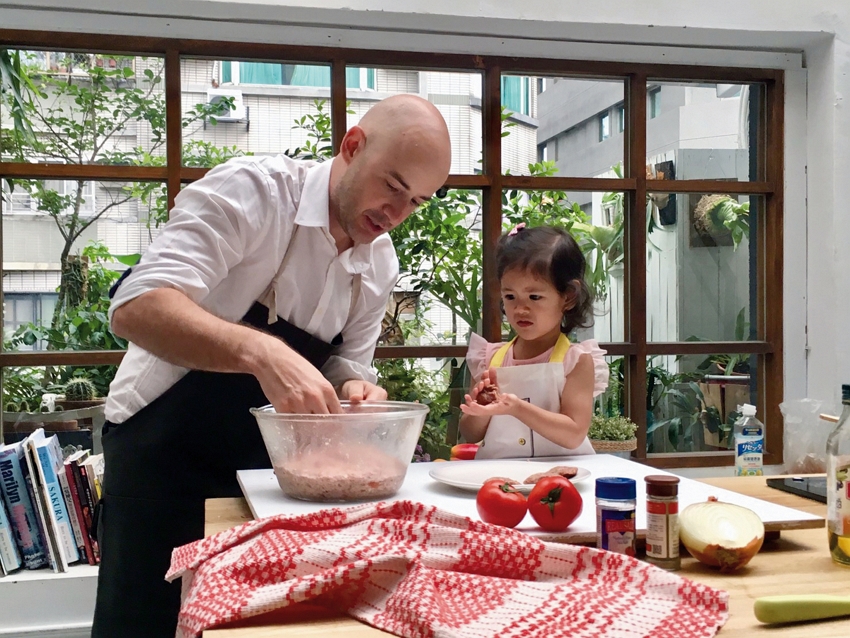
Better known to Taiwanese by his Chinese stage name Wu Feng, Rifat Karlova has been an exchange student, a TV extra, a husband, a Golden-Bell-winning travel-show host, and now, a card-carrying Taiwanese citizen. (courtesy of Rifat Karlova)
Having just wrapped up an interview, Rifat Karlova stands up to greet us: “Sorry to keep you waiting! I don’t have a lot of free time at the moment, so I lined up two interviews in a row,” he says in impeccable Mandarin. “Yi shi er niao!” The Chinese idiom, which translates to “two birds with one stone,” comes seemingly entirely naturally to him despite his foreign origins.

Rifat Karlova came to Taiwan many years ago to study and fell in love with the country. Today, he has built a family here and Taiwan has become his second home. (photo by Jimmy Lin)
Coming to Taiwan
In 2002, Rifat began studying sinology at Ankara University, and during that first year he set his mind on getting a scholarship to study in Taiwan from Taiwan’s Ministry of Education. Wanting to learn more about the country, he headed to the Taipei Economic and Cultural Mission in Ankara to meet some Taiwanese. Over dinners, he made a number of Taiwanese friends, not only exchanging languages but also making plans to travel together. He even invited his new friends to his home for Chinese New Year to help them feel a little less homesick so far away from home.
Finally, in August 2006, he successfully got his scholarship and booked his first ever flight, destination Taiwan. “Hot!” That was Rifat’s first impression of Taiwan as he stepped off the plane. The second was being bowled over by the hospitality of the Taiwanese people, something none of his textbooks had given him a sense of.
After spending his first year in Taiwan focusing on learning Chinese, Rifat then applied to National Taiwan Normal University’s graduate program in political science. His choice of thesis topic, “The Military Modernization of China during the Self-Strengthening Movement (1861‡1895) and Li Hong Zhang’s Impact,” is surprising. “You really need to understand the history of the late Qing to be able to properly understand modern Taiwan,” he says. After two years of graduate study and another two of independent research, he built on his thesis and published A History of Chinese Modernization in his native Turkish.

No matter where he goes, the amiable Rifat is always able to fit right in.
Breaking into entertainment
During his graduate studies, Rifat gained a deeper understanding of Taiwan’s history and culture. Outside the classroom, meanwhile, he was struck by how good the food, public safety, and environment were. The more he learned about Taiwan, the more he fell in love with it. Then he was sought out by the Public Television Service to have a guest role on a television show, and from his first time in the spotlight he saw the potential for foreign performers in Taiwan. He began contacting various agencies, but because of cultural and linguistic differences the interviews did not go his way, and for two years he was turned down for being “not suitable for the Asian market.”
Even though he would only get at most one or two opportunities here and there each month, Rifat stuck it out. “I was always so happy to get the phone call,” he says, “even though I’d only get about NT$500 for two days of outdoor shooting sometimes.” With opportunities scarce in Taiwan, his friends began encouraging him to head back to Turkey. “I knew I could go back and make good money in Turkey as a tour guide, but that seemed like taking the easy way out. I wanted to see how far I could go in Taiwan.” And so he budgeted out his money, rented a rickety rooftop apartment, and committed to sticking to his plans until he was down to his last dollar.

Rifat Karlova and the iWalker team have traveled the length and breadth of Taiwan to showcase its beauty for their audience.
For whom the Golden Bell tolls
Finally, in September 2011, he was given the opportunity to host the travel show iWalker, signing a five-year contract with his agent. Thus Rifat became the first foreigner to host a television show in Taiwanese prime time history.
Having previously worked as a tour guide in Turkey and studied Taiwanese history, he knew how to ask the right questions at the right time, ensuring that audiences didn’t just see where to get good food or have a good time, but also learned more about the local culture and history. With his slightly accented Mandarin, his ability to weave in occasional sentences in Taiwanese, and his natural and unpretentious hosting style, Rifat was quickly embraced by viewers. In 2012, he was honored with the Golden Bell Award for Best Travel Show Host.
Shooting a travel show on location might look easy from the outside, like you’re making money for just going out and having fun, but only those involved actually understand the real hard work it entails. Several years ago, when the “Seediq Bale” films were packing theaters, iWalker rode their popularity by sending Rifat and a production team out into the mountains of Wushe in Nantou County to explore Mona Rudao’s final battleground at the Mahebo grotto. The mountain roads were hard going, winding around cliffs, past landslides, and into misty woods. Without a local indigenous guide to lead them, they could easily have ended up lost. While they were in the grotto, they heard a strange noise, and eventually found out there had been a landslide nearby. “No joke, if we’d been 300 meters away from where we were, they’d never even find our bones.”

Among Rifat’s favorite cultural events are temple fairs and folk festivals.
Sharing Taiwan with the world
Rifat has seen virtually everything the people and places of Taiwan have to offer. What fascinates him most, though, is Taiwan’s temple festivals. He’s even been part of the Yanshui Beehive Fireworks Festival and the Baishatun Mazu Pilgrimage. For the latter, thousands of believers were gathered, letting off firecrackers and fireworks everywhere as the Eight Generals marched; for Rifat, it felt like a carnival.
He’s also taken his team to Turkey to introduce his homeland. He was even invited onto a local news show there to share his experiences as a foreigner in Taiwan’s entertainment industry. To give Turkish audiences a little taste of Taiwanese culture, he brought along a specially selected po-te-hi puppet as a souvenir.
Two years ago, his contract with his agent came up for renewal. He decided against it, hoping to give himself and his wife Rynne Chen a bit more freedom in how they choose to contribute to Taiwanese society. For example, he has been working with Global Kids Monthly, writing a serialized feature entitled “Traveling Taiwan with Wu Feng,” which uses lively and engaging stories of his own design to help children learn more about Taiwan. Right now, he says, the first chapter, “The Angel’s Tears—Jiaming Lake,” has been published, and in the future he plans to go on to introduce things like Taiwan’s ecology and folk cultures.

Rifat got his cooking skills from his aunt, and he hopes his children will have the chance to savor the flavors he remembers. He is also sharing those same tastes with others through his book.
Home is where the heart is
As an entertainer, Rifat hopes to be able to spread happiness and positive energy in his own way. Last year he started his own YouTube channel, recording parts of his life with simple equipment and learning to do the editing himself. Even when work is at its busiest, he still takes time out to upload at least three videos a week and share his thoughts and feelings with the public.
Videos so far have included taking his Turkish friends and family to the Taipei Zoo on the Metro, capturing the joy of the children as they get to see the pandas, and a night at Taipei Railway Station documenting what things are like for the homeless people there, something that brought him to tears on camera. Another video captured his experience at a hospital, showcasing Taiwan’s National Health Insurance system and advances in medical care. His videos have Turkish subtitles, making use of the global nature of the Internet to introduce Taiwan to people in his homeland.
Rifat has also written two books, and he is currently writing another one introducing Turkish home cooking to Taiwanese, sharing his family’s recipes and investigating them through the lens of food writing.
He just came here to study, but today he has settled down and has a wife and daughters. Now that he is a father, he says, Taiwan is more like home than ever, and as his home, it is only natural that he would not only love it, but also embrace both its strengths and its flaws. Whenever someone thanks him for showing so much love for Taiwan, Rifat is baffled. There’s so much to be proud of here, if only more local people knew. And thus he has made it his mission to show them, in his own way.
Last year, Rifat was granted Taiwanese citizenship, something which finally gave his father some peace of mind. Although the elder Karlova passed away from illness earlier this year, he is undoubtedly smiling down on his son as he continues to make a life, and a family, in Taiwan.











